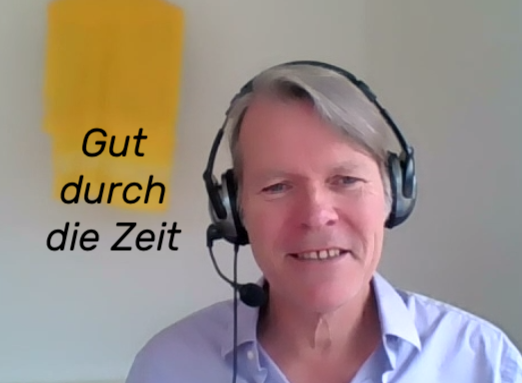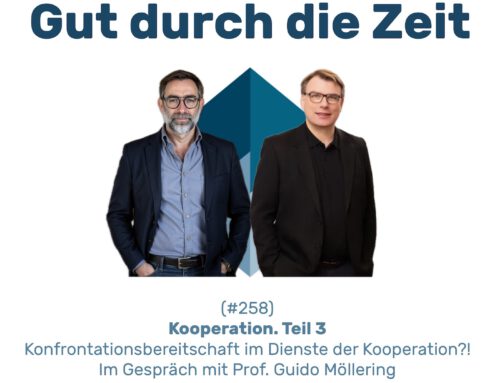INKOVEMA Podcast „Well through time“
#42 – History of Counselling (1 of 3). Antiquity and the Middle Ages
What we did when we didn't know what to do. In conversation with Haiko Wandhoff
Well through time. The podcast about mediation, conflict coaching and organisational consulting.
Haiko Wandhoff, Professor of Older German Literature at Humboldt University in Berlin and works as a freelance coach, consultant and trainer. In 2016, he published his 10 historical forays through the history of counselling under the title „What should I do? “ – a comprehensive historical work on the history of counselling.
Information on the series „History of Counselling“
Contents:
-
In Part 1 we fly over the Antiquity and the Middle Ages and learn various ideas for counselling.
-
Part 2 leads into the Early modern times and modernityespecially in the era of the Clarificationwhich was also a turning point for the idea of counselling, the result of which was a deep Counselling scepticism brought with it.
-
Part 3 will once again be dealing with a fundamental change that is taking place in the Postmodernism and the concept of the Counselling without advice led.
Central idea
…of this series is to gain a deeper understanding of today's counselling phenomena:
- What happens to the people involved in a counselling process beforehand when one person wants advice and the other prepares to give it?
- What influence does the advice have on the cognitive self-counselling processes – and what is the basic function of the advice?
- How does counselling relate to other forms of influencing communication? Proselytising, teaching, mentoring and commanding and other forms of domination?
- Why does everything that is offered in terms of counselling seem to have to be systemic?
- What's with the suggestion that advice is also a slap in the face?
- Why is our company called a consulting company?
- And how is it that you can hardly do any job with any seriousness today without immediately being courted with a counselling offer?
Contents of part 1:
-
…a few Words about the person
-
...a few Words on the idea of counselling
Counselling = forms of cognitive help to think things through, an influencing communication in which the focus is on the advantage of the person receiving the advice and from whom the – in principle voluntary – initiative originates.
-
Other forms of influencing communication (Conversion, Instruction, Care, Berror)
-
Etymological meaning of ADVICE and CONSULTANCY?
Stock, Household, Store…Store something…Advice, Riddle, Consult…
in English it is still in „to read“;
Antiquity
- Oracle sayings and star interpretation in antiquity:
- Institutional significance of oracles, advice as a riddle, enigmatic oracle saying in need of interpretation? (Information agencies, network of oracles)
- Function: Seeking out the oracle takes time and provides Time to think about it? Oracle's words were mostly enigmatic(!); contingency of the decision replaced by contingency of the oracle's words? What was that helpful for?
Practical tip:
"The first intervention in coaching is to find an initial appointment."
- Insights for counselling processes?
-
-
- CONFIDENCE was fundamental to the function of the oracle spells, (reflection for oracle spells)
- The LARGE TIME WINDOWS: To consult with yourself...pilgrimages later...
-
- Ability to give advice was one of the main virtues in antiquity alongside the ability to fight (Homer's Odysseus' cunning)
- Today Futurology as a counselling service: In the past, these were Viscera and bird flight inspector (augurs).
-
- Roman emperors nationalised the future
- Cicero's treatise "On Providence")
-
- Socratic maieutics
-
- Consulting as dialogue and philosophy
- Question as a guiding instrument
- Non-directive counselling, midwifery technique
-
- Sophists (450-380 BC) broke with the oracles shrouded in mystery and turned their love of truth into an earthly service. What do we know about the sophists for our topic?
-
- Man as the measure of all things
- Truth is a question of perspective
- Instruction and instruction
-
- Plato
-
- Criticises their earthly services, for money = corruptible...
- Plato then favoured the great solution – the philosopher makes the state.
- CHARISMATIC COUNSELLING (Plato, oracle etc., wisdom, presence, suggestion of knowledge of the right path) vs. PRAGMATIC ADVICE (Socrates, Sophists, Knowledge and Experience)
-
- Prophecies and horoscopes
- Astrology and the influence of the stars on people has always been plausible and self-evident, as has the fact that in ancient times a good doctor was always also an astrologer, unlike prophecy.
Middle Ages
- Counselling culture of the Christianity (priests, missionaries etc.)
- Teutons: Oral counselling formats from VIELEN, Form of reflective counselling, many go together and consult with each other. What is there to say? Corresponds to today's Training formats! The group as a place of learning is above all a place of reflection.
- Court days and from 1495 so-called wealth daysAt first irregularly, in changing places, an instrument of power of the emperor, later a constitutional body in which one was allowed to participate and, as a corporative body of the estates, the nucleus of parliamentarism.
- Consilium et Auxilium (advice and assistance) and consensus in the Middle Ages of the HRRDN
- Consultation was a mandatory, reciprocal legal act; some had to give advice, the ruler had to take advice.
- Court jesters and mistresses
-
-
- Court jesters were depicted with mirrors (self-absorption and self-knowledge)
- Master of paradox intervention
- Signum of the humanists, (We are all fools)
- foolish advice at court, independent, not belonging, non-binding advice, uncorruptible, etc.
- Watzke's transgressive mediation
-
- Secretaries and Privy Councillors
-
-
-
- They replace the Estates Councils
- Transition from oral to written form
-
-
Left:
- Website for the book (publisher's page): „What should I do?“, Corlin-Verlag, 2016.





Leave A Comment